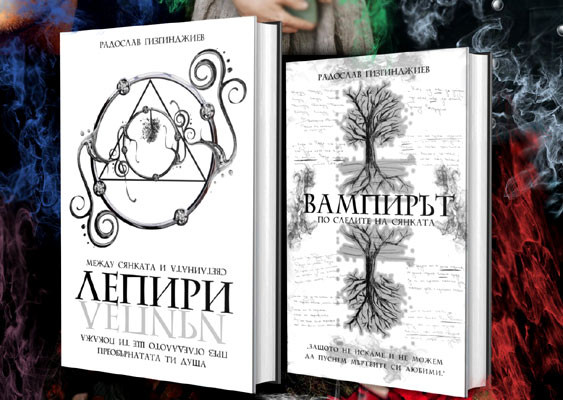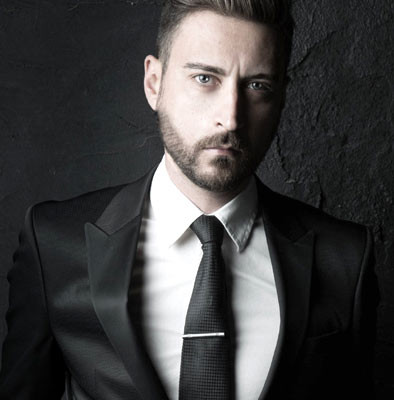 Five years ago, an interesting and unexplored topic provoked Radoslav Gizgindzhiev to research a vast number of ethnographic materials, folklore beliefs and archives of Bulgarian folk songs. Two years later he wrote his diploma work, entitled "The Vampire in Bulgarian Folk Song". Not long after that, both his books on the same topic were published. "The Vampire: Following the Shadow’s Trail" contains interesting facts about the beliefs of Bulgarians, concerning vampires and the afterlife.
Five years ago, an interesting and unexplored topic provoked Radoslav Gizgindzhiev to research a vast number of ethnographic materials, folklore beliefs and archives of Bulgarian folk songs. Two years later he wrote his diploma work, entitled "The Vampire in Bulgarian Folk Song". Not long after that, both his books on the same topic were published. "The Vampire: Following the Shadow’s Trail" contains interesting facts about the beliefs of Bulgarians, concerning vampires and the afterlife.
"Lepirs: Between Shadow and Light" is a novel in which Radoslav Gizgindzhiev interprets ideas from ancient folk beliefs. He has studied about 10 songs, but points out that a folk song has many variants and in different regions people performed it in different ways with changes in the storylines. The songs are probably very old, dating back to times before the Liberation (1878).
 “The image of the vampire in folk songs is very different from that in legends and fairy tales. The old Bulgarians believed that the vampire had a demonic, threatening and fearsome image, but vampires did not have sharp teeth or drank blood. In the folk song, we have a specific image,” Radoslav Gizgindzhiev says. “The image is of a man who returned from the dead to seek his beloved woman and the songs make it clear that he takes away the life force of the woman whom he had returned for, because he cannot go beyond without her. The most interesting thing is that the woman does not mind this contact. She gives the vampire food and water to drink. In other songs she voluntarily goes after the ‘shadow’. That's what provoked my research. Behind the vampire's image there is something very romantic – the topic of love that continues to live beyond death at all cost.”
“The image of the vampire in folk songs is very different from that in legends and fairy tales. The old Bulgarians believed that the vampire had a demonic, threatening and fearsome image, but vampires did not have sharp teeth or drank blood. In the folk song, we have a specific image,” Radoslav Gizgindzhiev says. “The image is of a man who returned from the dead to seek his beloved woman and the songs make it clear that he takes away the life force of the woman whom he had returned for, because he cannot go beyond without her. The most interesting thing is that the woman does not mind this contact. She gives the vampire food and water to drink. In other songs she voluntarily goes after the ‘shadow’. That's what provoked my research. Behind the vampire's image there is something very romantic – the topic of love that continues to live beyond death at all cost.”
According to folk songs, a dead man can turn into a vampire if he was improperly buried; if he was a person who did not live by the rules of society back then; a person who committed suicide or murder, or a person who lived in a sinful way. In his studies, Radoslav Gizgindzhiev also mentions an interesting profession – that of the vampire hunter.
“It was a quite real profession and was extremely popular in Bulgarian lands. Whole villages have collected large amounts of money to pay the vampire hunter in order to find the vampire’s grave and stop him using icons, herbs, rituals, etc.,” Radoslav explains. "When there were problems in the village, such as hail, livestock deaths, or diseases, people blamed them on the vampire.”
What were the rituals old Bulgarians performed to prevent dead men from turning into vampires?
“There were many rituals. Almost 80% of today's funeral rituals are anti-vampire rituals. People have believed that any failure to observe funeral rituals leads to the dead becoming a vampire. If a candle was not lit, or a shadow passed over the body of the deceased, or if a cat jumped over it, the dead man could become a vampire,” Radoslav Gizgindzhiev adds. “Many people do not know we have many folk songs about vampires. But I found deeper meaning in this image. The songs reveal the topic of love and death. Bulgarians believed that death was a continuation of life, but some part of man did not want to let go of his beloved and created this demon so that he, like a shadow, could return and take the woman's vital power. She then starts withering before love and death meet in eternity.”
Radoslav Gizgindzhiev started promoting his two books in Bulgaria on April 25. Upcoming dates and cities can be found on the author’s Facebook page.
English: Alexander Markov
Photos: private libraryToday is Babinden (Midwives' Day) - one of the most beloved and authentic Bulgarian holidays deeply rooted in local folk tradition . Celebrated on 8 January in the new style calendar and January 21 in the old style, it is dedicated to the women who used..
On Ivanovden, the village of Alvanovo (Northeastern Bulgaria) observes the custom called "Bathing the Sons-in-Law". The ritual is performed for health and prosperity of young couples who got married in the past year, reported BTA, referring to Valya..
The Borisova Garden in the heart of Sofia will once again become the stage for the Surva mummers' festival traditionally held in the town of Pernik. For the third consecutive year, Sofia residents and guests of the capital will be able to enjoy the..

+359 2 9336 661
